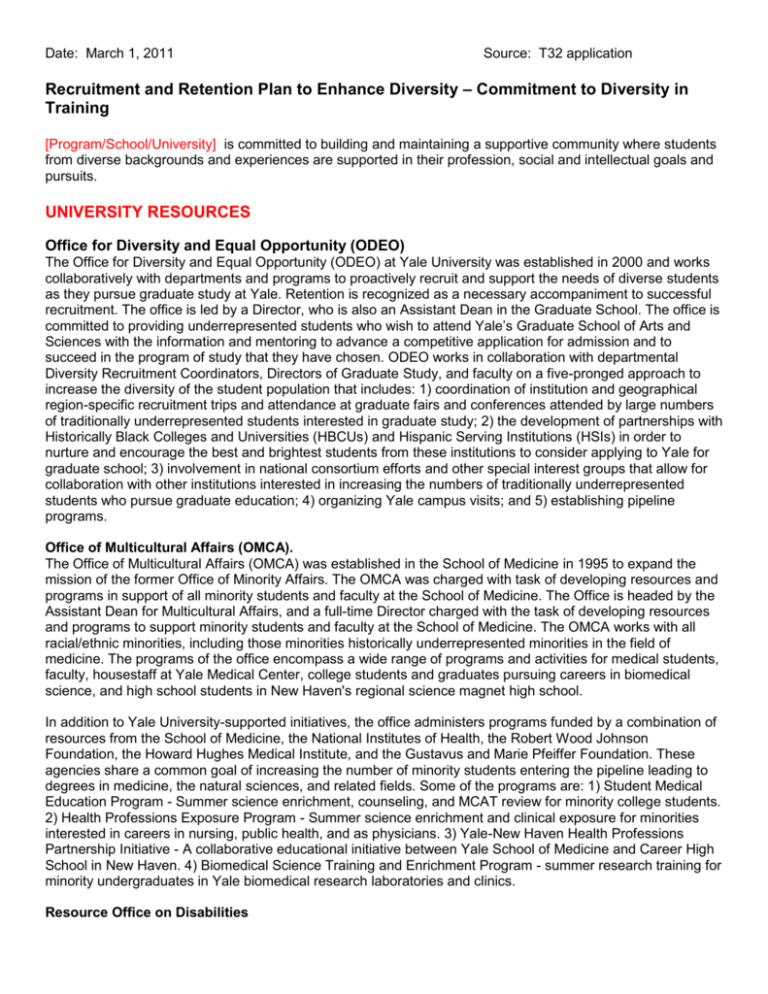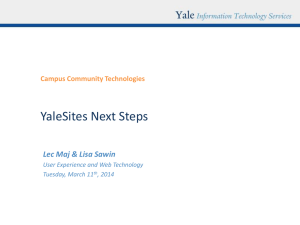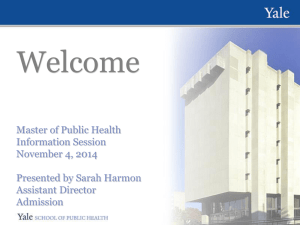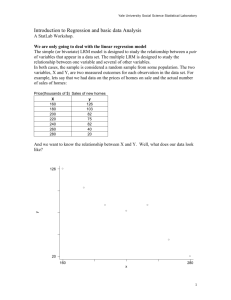Recruitment and Retention - Office of Grant and Contract
advertisement

Date: March 1, 2011 Source: T32 application Recruitment and Retention Plan to Enhance Diversity – Commitment to Diversity in Training [Program/School/University] is committed to building and maintaining a supportive community where students from diverse backgrounds and experiences are supported in their profession, social and intellectual goals and pursuits. UNIVERSITY RESOURCES Office for Diversity and Equal Opportunity (ODEO) The Office for Diversity and Equal Opportunity (ODEO) at Yale University was established in 2000 and works collaboratively with departments and programs to proactively recruit and support the needs of diverse students as they pursue graduate study at Yale. Retention is recognized as a necessary accompaniment to successful recruitment. The office is led by a Director, who is also an Assistant Dean in the Graduate School. The office is committed to providing underrepresented students who wish to attend Yale’s Graduate School of Arts and Sciences with the information and mentoring to advance a competitive application for admission and to succeed in the program of study that they have chosen. ODEO works in collaboration with departmental Diversity Recruitment Coordinators, Directors of Graduate Study, and faculty on a five-pronged approach to increase the diversity of the student population that includes: 1) coordination of institution and geographical region-specific recruitment trips and attendance at graduate fairs and conferences attended by large numbers of traditionally underrepresented students interested in graduate study; 2) the development of partnerships with Historically Black Colleges and Universities (HBCUs) and Hispanic Serving Institutions (HSIs) in order to nurture and encourage the best and brightest students from these institutions to consider applying to Yale for graduate school; 3) involvement in national consortium efforts and other special interest groups that allow for collaboration with other institutions interested in increasing the numbers of traditionally underrepresented students who pursue graduate education; 4) organizing Yale campus visits; and 5) establishing pipeline programs. Office of Multicultural Affairs (OMCA). The Office of Multicultural Affairs (OMCA) was established in the School of Medicine in 1995 to expand the mission of the former Office of Minority Affairs. The OMCA was charged with task of developing resources and programs in support of all minority students and faculty at the School of Medicine. The Office is headed by the Assistant Dean for Multicultural Affairs, and a full-time Director charged with the task of developing resources and programs to support minority students and faculty at the School of Medicine. The OMCA works with all racial/ethnic minorities, including those minorities historically underrepresented minorities in the field of medicine. The programs of the office encompass a wide range of programs and activities for medical students, faculty, housestaff at Yale Medical Center, college students and graduates pursuing careers in biomedical science, and high school students in New Haven's regional science magnet high school. In addition to Yale University-supported initiatives, the office administers programs funded by a combination of resources from the School of Medicine, the National Institutes of Health, the Robert Wood Johnson Foundation, the Howard Hughes Medical Institute, and the Gustavus and Marie Pfeiffer Foundation. These agencies share a common goal of increasing the number of minority students entering the pipeline leading to degrees in medicine, the natural sciences, and related fields. Some of the programs are: 1) Student Medical Education Program - Summer science enrichment, counseling, and MCAT review for minority college students. 2) Health Professions Exposure Program - Summer science enrichment and clinical exposure for minorities interested in careers in nursing, public health, and as physicians. 3) Yale-New Haven Health Professions Partnership Initiative - A collaborative educational initiative between Yale School of Medicine and Career High School in New Haven. 4) Biomedical Science Training and Enrichment Program - summer research training for minority undergraduates in Yale biomedical research laboratories and clinics. Resource Office on Disabilities Date: March 1, 2011 Source: T32 application The primary mission of the Resource Office on Disabilities is to facilitate individual accommodations for students with disabilities, and by so doing, work to remove physical and attitudinal barriers, which may prevent their full participation in the University community. Often, the physical barrier is the easiest to remove the attitudinal barriers are much more difficult. To create a university community, which is truly accessible to and inclusive of all persons, including people with disabilities, requires the participation of each and every member of the community. Toward this goal, the Office serves as a resource and a catalyst for change by providing technical assistance, information, and disability awareness training to any member of the Yale community. In recruitment, we will link fellows who identify with disabilities with the Resource Office on Disabilities and our T32 training faculty will work actively with this office to ensure that needs of disabled fellow are met. Biomedical Committee for Minority Graduate Student Recruitment Biomedical Committee for Minority Graduate Student Recruitment is a standing committee of Yale University charged with developing further strategies to increase minority recruitment. Achievements at the School of Medicine. The Yale University School of Medicine has made a strong commitment to training underrepresented minority physicians and scientists. Over the past 30 years, over 300 African American students have graduated with MD's or with combined MD/PhD degrees; African American graduates account for 9.5% of the MD's graduating from the School during this period. Beginning in the mid1980's, Hispanic/Latino and Asian American students began to account for an increasing proportion of the classes admitted. Asian American, African American, and Hispanic / Latino students now comprise 40% of the Yale medical student class: In addition, approximately 12 students each year are accepted into Yale's MD/PhD program. PIPELINE PROGRAMS AND NATIONAL CONSORTIUM AFFILIATIONS Yale has instituted ‘pipeline programs’ and affiliated itself with National Consortium to aid in diversity recruitment. The Yale University Graduate School Post-Baccalaureate Research Education Program (Yale PREP) is a research training initiative aimed at encouraging underrepresented minority students to enter biomedical and behavioral science graduate programs. Yale PREP Scholars are engaged in faculty-mentored research for one to two years and participate in an educational program that includes graduate courses, research seminars, graduate school preparation and career development workshops, information technology training, and problem-based learning. Participants are provided with: graduate student mentors; salary support as a research assistant in a Yale faculty laboratory; tuition remission; and travel funds to present work at a scientific meeting each year. The Yale University Graduate School Summer Undergraduate Research Fellowship (SURF) Program brings undergraduates to Yale for 8 weeks to familiarize students with graduate school work, provides them with insight on careers based on Ph.D. level training, and fosters a sense of confidence in their abilities. Students are immersed in an academic, professional setting with a faculty mentor, a program of individual research, and a series of program workshops and panel discussions. All students give a final presentation to their peers, submit a written paper, and attend the Leadership Alliance Conference to present their research. The program is particularly interested in identifying and providing research experience to talented underrepresented minority students, including those from disadvantaged backgrounds. Mellon and Ford Foundation Programs have brought minority undergraduates to Yale laboratories. Some of these students are from Ivy League schools but most are from predominately minority institutions. The NIMH Career Opportunities in Research (COR) Honors Undergraduate Research Training Program supports students from underrepresented groups in disciplines relevant to mental health research. Summer Medical and Dental Education Program (SMDEP) provides intensive immersion in science topics, clinical medicine, and MCAT review for minority pre-medical students. Approximately one hundred undergraduate minority students are brought to Yale each summer. Yale SMDEP is currently funded by the Robert Wood Johnson Foundation. Date: March 1, 2011 Source: T32 application Biomedical Science Training and Enrichment Program (BioStep) provides intensive, short-term summer research training for minority undergraduates in order to foster their interest in careers in the biomedical sciences. Trainees conduct research projects for 10 weeks in laboratories and training sites at the Yale School of Medicine and the West Haven Veterans Administration Medical Center. Each student works in the laboratory of a Yale faculty member who serves as a mentor. A number of the participating faculty members of the Hematology Training grant also participate in this program. The program has been funded continuously since 1991 by a T35M grant of the National Heart Lung and Blood Institute. Positions for 24 students are offered each year. Participants are selected competitively from a national applicant pool of over 300 college students. More than 50% of BioSTEP applicants and participants attend Historically Black Colleges and Universities or Hispanic Serving Institutions. Over 150 Yale faculty members have served as laboratory mentors for this program. The Yale-Career Partnership brings together Hill Regional Career High School a regional magnet high school in New Haven, with Yale School of Medicine and Yale School of Nursing in a collaborative educational partnership. SCHOLAR (Science Collaborative Hands-On Learning and Research), an important component program of the Partnership, offers summer residential science academic programs conducted on the Yale College campus for 75 pre-sophomore, junior, and senior Career High School students. The Institute for Recruitment of Teachers/IRT is a national consortium that offers programs for minority college students and recent graduates that prepare them for graduate level work. They host a 4-week summer workshop, provide hands-on assistance throughout the graduate school application process, and host a Recruiter’s Weekend. Since its inception, every participant has been admitted to at least one graduate school (typically four or more), and over 90% have received funding for up to six years of graduate study. The Leadership Alliance is an academic consortium of 33 of the leading research and teaching colleges and universities in the country that are dedicated to improving the participation of traditionally underrepresented students in Master’s and Doctoral programs, and, ultimately, research careers in the academic, public, and private sectors. The Graduate Horizons Program is an annual four-day workshop addressing pertinent issues facing Native American enrolled members, First Nations, Alaska Native, and Native Hawaiian undergraduate and Master’s students as they prepare to enroll in graduate programs. The National Name Exchange was established to help match graduate schools with traditionally underrepresented students interested in graduate education. DEPARTMENTAL INITIATIVES Promotional Efforts: The Department of ___________ routinely will reach out to minority applicants through advertising at the annual meeting of the ______________, and in the AMA database. We will advertise in ________ (name Journals), the Journal of the National Medical Association, and in ACGME publications. We will display posters at meetings of the Society for _______, FASEB, the National Medical Association and, at events sponsored within the School of Medicine. We will travel to outside institutions to encourage students to consider Yale University as a potential institution for graduate study. We are also able to direct potential applicants to our website which is linked to and accessible from the Medical School website. Presentations: Individual investigators on this training grant will make themselves available to meet with minority caucus groups at national meetings. For example, Dr. ____________, PI, serves as a program mentor for the NIH-sponsored PRIDE program (Programs to Increase Diversity among Individuals Engaged in HealthRelated Research). Candidate Interviews: Since most of our trainees are now recruited via the national fellow match (ERAS), we will also encourage minority recruitment by inviting every qualified minority applicant to visit our program. Date: March 1, 2011 Source: T32 application ADDITIONAL PROGRAM SPECIFIC DESCRIPTIONS Public Health Utilizing the institutional diversity recruitment programs indicated above, Dr. ___PI____, in conjunction with the Executive committee and all of the Division of Health Policy and Administration, will make specific programmatic efforts to recruit predoctoral fellows who are underrepresented race and ethnic minorities, disabled or disadvantaged, to our training program. Dr. Ingrid Nembhard is a minority faculty and is highly active in recruitment of minority students. Dr. Susan Busch serves as the liaison between the Doctoral Committee and the Yale Graduate School of Arts and Sciences. Both Drs. Nembhard and Busch are in the Division of Health Policy and Administration. In addition, all members of the training faculty who attend scientific meetings or give lectures and seminars or collaborate with colleagues in other universities will be formally urged not only to meet with individuals suggested by their host. Finally, faculty will be encouraged to reach out to personal contacts within universities and training institutions and urge them to direct top underrepresented race and ethnic minorities, disabled or disadvantaged candidates to our training program. Note that faculty affiliated with this training grant will be encouraged to research projects to apply for minority supplements when eligible and feasible for our eligible trainees. Pediatrics Yale Pediatrics has a strong and current history of recruitment of women and underrepresented minorities. At present 72% of Yale Pediatrics or Medicine-Pediatric residents are women, and 27% are minorities, which represents an increase of 200% over the past five years. Presently, 52% of Yale Pediatric fellows are women and 12% are minorities. In the Department of Pediatrics Marie Egan, MD, a preceptor for the fellowship-training program, has been appointed the Department’s Recruitment Officer. She is a mid-career faculty member with a high national profile and has been recognized with the Leah Lowenstein Faculty Teaching Award of the Yale School of Medicine and membership in the Society of Distinguished Teachers at Yale. Nationally, she has served as Membership Secretary of the Society for Pediatric Research (2003-2009). Both of these positions give her considerable influence with medical students at Yale (1/5 are African American or Hispanic) and with the Summer Students Research Program of the Society for Pediatric Research (SPR), which enrolls 30% minority medical students annually. Dr. Egan is responsible for linking locally with the Medical School to enhance the recruitment of Yale trainees to our program. In addition, her national role places her in an excellent position to monitor minority students selected for the SPR Student Summer Research Program. Each of these medical students will be sent a brochure describing our program and also encouraged to apply for subsequent summer research funding from the Student Summer Research Program at the Yale Child Health Research Center. .





